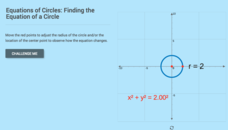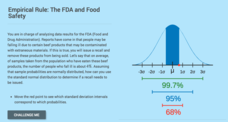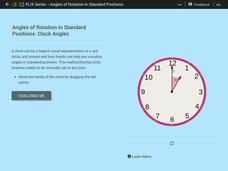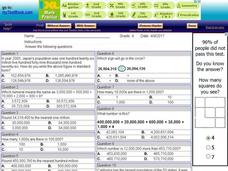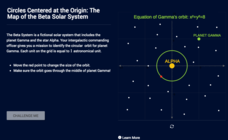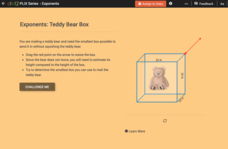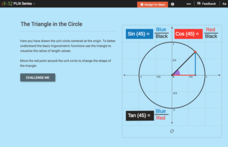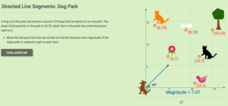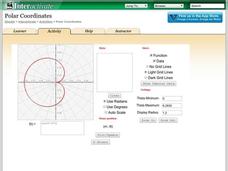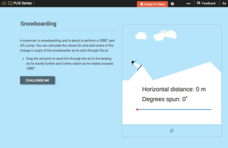CK-12 Foundation
Standard Form of Linear Equations: Seesaw
Don't hem and haw, learn about equations using a seesaw. An easy-to-use interactive has pupils move a seesaw on a coordinate plane to investigate the standard form of a linear equation. By completing a set of challenge questions, they...
CK-12 Foundation
Polynomials in Standard Form
Set the standard for working with polynomials. Pupils arrange two polynomial expressions in standard form. The scholars respond to questions about the terms, coefficients, and degrees of the polynomials. They then discuss how they...
Curated OER
My Test Book: Math Review
Test that number sense with this 10 question quiz. This quiz contains 10 questions intended to assess how well second graders understand standard form, expanded form, number patterns, and numeric quantity or value.
CK-12 Foundation
Forms of Linear Equations: Equation Exploration
Different forms, same line. Young mathematicians investigate the standard form, slope-intercept form, and point-slope form of a linear equation. An interactive has them adjust lines on a coordinate plane to see changes in each form of...
CK-12 Foundation
Equations of Circles: Finding the Equation of a Circle
It's all about location and size. With the aid of the interactive, pupils explore the relationship between the location and size of a circle and its equation. The learners use that relationship to determine the equation of a circle given...
CK-12 Foundation
Computing Probabilities for the Standard Normal Distribution: The FDA and Food Safety
To recall or not to recall, that is the question. Using provided data, pupils calculate the percent of people that may fall ill on average. The scholars determine the standard deviation based upon the mean and the empirical rule,...
Curated OER
Place Value: Post Test
Math whizzes answer multiple choice questions about standard form, expanded form, and more. They complete 10 questions total.
CK-12 Foundation
Intercepts and the Cover-Up Method: The Hidden Zeros
There's no need to cover up this resource — it's good one! Pupils use a slider interactive that covers up parts of the standard form of a linear equation and simultaneously reveals one of the intercepts of the graph. This lets them see...
CK-12 Foundation
Angles of Rotation in Standards Positions: Clock Angles
Use a clock face to develop angles representing standard position angles. The interactive allows pupils to create angles using the hands of a clock. Scholars discover that there is a difference in the angle formed using a clock face and...
Curated OER
My Test Book: Standard and Expanded Form
In this online interactive math skills worksheet, students solve 10 multiple choice math problems regarding standard and expanded form. Students may view the correct answers.
Scholastic
Study Jams! Relate Addition & Subtraction
Understanding the inverse relationship between addition and subtraction is essential for developing fluency in young mathematicians. Zoe and RJ explain how three numbers can form fact families that make two addition and two subtraction...
Scholastic
Study Jams! Bar Graphs
Mia teaches Sam how to create a bar graph, including forming a title, creating and labeling the axes, choosing a scale, and entering data. After viewing, data analysts can test themselves with seven follow-up questions and review...
Curated OER
Place Value Pretest
Here is a using place value with large numbers instructional activity in which learners interactively answer 10 multiple choice questions, then click to check their answers.
CK-12 Foundation
Variance of a Data Set
Use variable value sliders to understand variance. The interactive shows four whole numbers, their mean and deviation. Using the information, pupils find the variance of the numbers and respond to question related to the understanding of...
CK-12 Foundation
Circles Centered at the Origin: The Map of the Beta Solar System
Calculate galactic orbits in a far-out resource. Pupils drag a point on a circle to graph the orbit of a fictional planet. Using the equation, they find points through which the orbit passes. To finish the simulation, users determine the...
CK-12 Foundation
Whole Number Exponents: Teddy Bear Box
Five questions—multiple-choice, fill in the blank, and discussion—make up an interactive that challenges scholars to mail a teddy bear using the smallest box possible without squishing it. A box with movable sides allows mathematicians...
CK-12 Foundation
DeMoivre's Theorem and nth Roots: The nth Roots of Unity
The nth roots of unity all have a magnitude of one. Scholars use the unit circle and DeMoivre's Theorem to find the complex roots of one and discover that the complex numbers all lie on the unit circle and are equally spaced around it...
Shodor Education Foundation
Linear Inequalities
An interactive lesson helps individuals learn to graph inequalities in two variables. Scholars can adjust the interactive to present the inequalities in standard or slope-intercept form.
CK-12 Foundation
Reciprocal Identities
Get a better understanding of the trigonometric functions by taking a look at the flip side. Pupils create angles within a unit circle and compare the values of the standard trigonometric functions to their reciprocal functions. The...
CK-12 Foundation
Trigonometric Functions and Angles of Rotation: The Triangle in the Circle
Go around the unit circle and create triangles. Pupils move a point around the unit circles to visualize the triangle associated with the angle in standard position. The three main trigonometric functions are defined in terms of the legs...
CK-12 Foundation
Directed Line Segments: Dog Park
Its a dog's world! Using a vector in standard position, pupils model the path a dog takes to different items in a dog park. The individuals use the interactive to find the magnitude and direction of the directed line segment.
CK-12 Foundation
Sampling Distribution of a Sample Mean: The Mean of the Average Ages
What does it mean to take the mean of the mean? An easy-to-use interactive has users adjust the mean ages of different samples. Finding the average of these sample means gives an estimate of the population mean.
Shodor Education Foundation
Polar Coordinates
Polar opposites might not work together—but polar coordinates do! The interactive provides learners the opportunity to graph trigonometric and algebraic functions using polar coordinates. The program takes either individual data points...
CK-12 Foundation
Trigonometric Functions of Angles Greater than 360 Degrees: Snowboarding
Spin through the trigonometric functions. Scholars determine the angle of rotation a snowboarding snowman makes at various distances in his jump. The class members then calculate the values of trigonometric functions for those angles.




